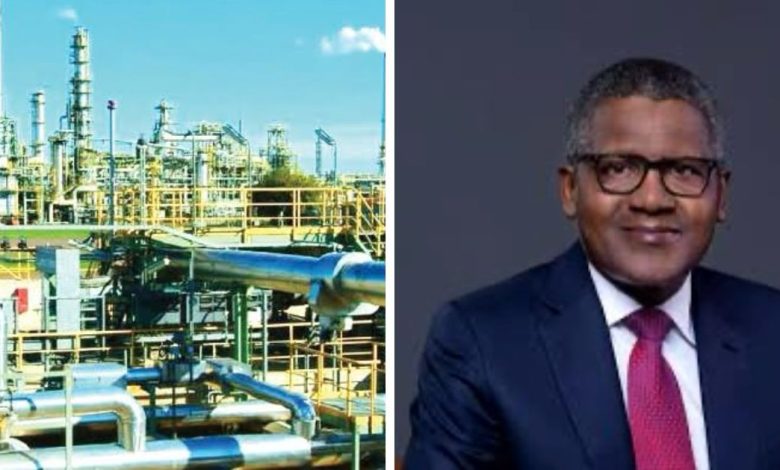
By Femi Bamidele
The recent news that the $20 billion, 650, 000 barrels- per -day capacity Dangote Refinery, has commenced operations has been eliciting shouts of hurray from several quarters in Nigeria and outside.
The excitement locally is because our people are finally seeing the proverbial light at the end of the tunnel, after decades groaning under the crushing economic impact of rising cost of petroleum products, and the resultant multidimensional implications on living conditions in the country.
The palpable excitement, animation and enthusiasm among the people, on account of the information regarding the refinery that was commissioned in 2023, are apparently understandable, given the projected positive multiplier effect the humongous investment would deliver to the economy of Nigeria when production is in full-scale. It is the Nigerian people and the economy that are the ultimate beneficiaries.
Alhaji Aliko Dangote, the principal investor in the mega project said at the inaugural event that the refinery would meet 100
percent of Nigeria’s consumption needs of all refined petroleum products, which is estimated to be 450,000 barrels per day, while the excess production would be available for export.
Also confirming this projection, the former Central Bank of Nigeria Governor, Godwin Emefiele, at the commissioning event suggested that Dangote refinery could earn Nigeria foreign exchange savings of between $25bn and $30bn yearly. He said that this would impact positively on the nation’s foreign reserves and help to greatly ease the burden on the Naira which has seen it lose value to the dollar by over 40% since the beginning of 2014.
In addition, permanent job creation from the multiplier effect of Dangote Refinery is estimated to be around 350,000, direct and indirect. This news may sound like music in the ears of millions of unemployed Nigerians and to others in a country with unemployment rate of 4.2%, according to 2023 Quarter 2 report by the Nigerian Bureau of Statistics – NBS.
This project, many said, is perhaps, the biggest singular public relations and seeming image and reputation management development for our nation Nigeria in recent times, considering the gloomy news that flood the nation daily, especially in the areas of security and depressing human conditions in a challenging economy.
This feat is evidently receiving pleasant impression and endorsement about Dangote, even from outside Nigeria’s jurisdiction. On Friday 2nd February 2024, Nigerian news dailies reported that President Macky Sall of Senegal conferred on Alhaji Aliko Dangote the highest national honour in the country – the Order of the Lion. The recognition, though personal, could also, in a way, rub off on all Nigerians.
President Bola Ahmed Tinubu, in a statement by Ajuri Ngelale, the presidential spokesman, applauded Alhaji Aliko Dangote over this honour, as he extolled his virtues, among which are his “Enterprise and ingenuity, creating jobs and opportunities for many in Nigeria and across West Africa, as well as contributing to their economies, which the award further affirms”.
The Guardian editorial of February 1, 2023, underscored this collective widespread optimism thus: “Optimistic Nigerians look forward to the Dangote refinery meeting their expectations that its operations can reduce the country’s reliance on fuel imports, which can positively impact the trade balance and foreign exchange reserves; ensure supply of products at all times and ultimately, that the local refining on the Dangote scale will bring down prices of petrol and other petroleum products.”
But is Nigeria taking full advantage of this huge economic development and its remarkable public relations components as expected? Not many would agree with that given recent developments concerning the project.
This overwhelming excitement and optimism may be facing a brutal bruising, with the recent disturbing viral news that the Dangote Refinery, located in Nigeria – Lekki Free Trade Zone, Lagos state – was sourcing for crude oil for its production from the United States of America, in spite of the fact that Nigeria is an oil producing nation.
The foreign media is already feasting on it. According to reports from different platforms – originating from the report of Bloomberg – Trafigura Group sold two million barrels of WTI Midland crude to Dangote Refinery, which is expected to arrive month end.
Checks indicated that Trafigura is a multinational commodity trading company with headquarters in Singapore, with major hubs in various locations including Geneva, Houston, Montevideo and Mumbai.
This raises the question, why is Nigeria not able to supply enough crude to the Dangote Refinery for sustainable production, given the above listed economic benefits to the nation?
A well-known elementary economic principle of citing a production factory is “nearness to the source of raw materials”. In this case, America will never be closer to Lagos state, where Dangote Refinery is located. The refinery is closer to the oil producing Niger Delta, in Nigeria. So, I ask again, why is Nigeria putting its sore foot forward again for the whole world to see? What’s the fate of the millions of people whose hope of some kind of economic redemption is anchored on the positive supply and pricing regime that a successful seamless production of a Dangote Refinery promises?
Although the refinery has received six million barrels of crude in a number of tranches from the Nigeria National Petroleum Corporation Limited (NNPCL), and other international operators from Nigeria, the supply is obviously not enough, hence the decision to source for crude from other climes, perhaps for better consistency and sustainability. And even pricing.
Some industry insiders had revealed that the NNPCL had committed its crude to other entities. For what reason? One may ask. For better insight, the NNPCL had last year disclosed that it had entered into a $3bn crude oil-for-loan deal with African Export-Import Bank. The deal allowed the company to pledge future oil production to the bank as repayments for the loan. There’s a possibility of similar deals, which may have mortgaged Nigeria’s crude. This weakens its supply capacity and integrity, as manifesting, sadly, at the moment.
Some observers also blame Nigeria’s erratic crude oil production in the past few years as a result of rising incidents of crude oil theft, insecurity in the Niger Delta and divestment by oil majors in the country. But should a multi-billion dollars indigenous investment, which has the potential of economic stimulation and bringing succour to many, be allowed to face hard times sourcing for raw materials – which the nation has in abundance – from other climes, on account of failures of government institutions? This is not right.
This does not encourage investment in the nation. It actually calls for government’s urgent attention and action. We should not frustrate the efforts of Alhaji Aliko Dangote who has patriotically invested in Dangote Refinery and may ‘Nigeria not happen’ to the project.
Bamidele, a public affairs analyst, wrote from Osun state.



